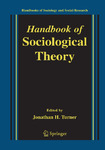| dc.description.abstract | One of the most obvious trends in sociology over the last 30 years is differentiation of substantive specialties. What is true in the discipline as a whole is particularly evident in sociological theory. Where once there were just a few theoretical perspectives, e.g., functionalism, symbolic interactionism, conflict theory, exchange theory, now there are many. In one sense this differentiation is exciting and signals the emergence of new ideas, while in another light the splintering of theory indicates that there is no consensus over how sociology should proceed to explain the social world. I assembled the authors in this "handbook" (more like an "armbook") with an eye to capturing the diversity of theoretical activity in sociology. Even my original list of authors did not cover all of theory and as the months went by I lost four or five authors who, for various reasons, could not complete their chapters. The result is that the volume is not quite as broad as I had hoped, but it still covers most theoretical approaches in sociology today. This is a handbook, implying that it is to be used as a basic reference, but it is a special kind of handbook: it is about the forefront of theory. I asked authors to tell the reader about what they are doing, right now, rather than what others have done in the past. Those looking for textbook summaries or "annual review" type chapters will be disappointed; those seeking to gain insight into theory as it is unfolding today will be pleased. Thus, the goal of this volume is to allow prominent theorists working in a variety of traditions to review their work. This is a handbook, but it is one devoted to theorists telling us about their latest work. I did not seek textbooklike reviews of fields, but rather forefront work in a field. Of course, in presenting their ideas, the authors of the chapters in this volume place their arguments in an intellectual context, but only to explain what they are doing at the forefront. As will be evident, the authors took my charge in different directions. All asked me how much summary of the field and how much of their own work they should present. My answer was to do what they wanted but with an emphasis on their own work. What are they doing? In what tradition is this work? What are the problems and issues? How are they to be resolved? The result is a volume that provides overviews of traditions but more importantly that shows where theoretical sociology is going. I hope that the reader finders these chapters as engaging as I do. | en_US |

